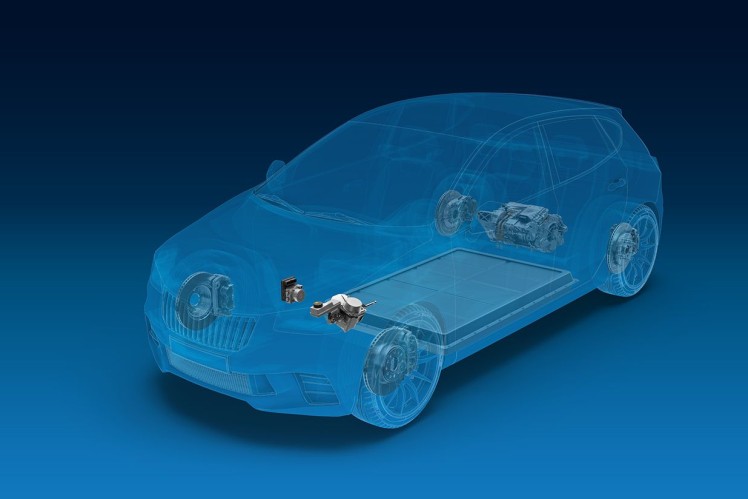Enhanced Safety and Energy Recuperation highlight ZF’s newest Brake System for electric vehicles - State of the art brake control system will be used across complete model range of Volkswagen’s MEB platform
- Regenerative braking increases range of electric vehicles
- Software interface facilitates feature integration and networking
ZF confirms its position as a technology and system supplier for electromobility with a new series production order. The latest in ZF brake control solutions will be established as standard in Volkswagen’s ID.3 and ID.4 models as well as in Volkswagen Group’s globally marketed MEB modular e-drive system platform. With its new brake control, ZF can help to meet high comfort and safety requirements. Furthermore, it optimizes the recovery of braking energy – thus increasing the range and everyday usability of electric vehicles.

Volkswagen Group’s order for the new ZF brake control system covers several million vehicles – starting with the recently introduced ID.3 and ID.4 and continuing with future models based on the manufacturer’s MEB e-drive platform.
The use of ZF technology enables further benefits: With an optimized software interface, ZF's new braking system can be easily integrated in and interlinked with the electronic architecture of Volkswagen vehicles. The ZF system also supports driver assistance features such as automatic emergency braking. In addition, ZF's solution replaces previously necessary mechanical components with software functions, which saves both weight and costs.
"We meet the trend toward electromobility with our entire range of technological solutions – not just in driveline technology," says Wolf-Henning Scheider, CEO of ZF Group. "This supply order from Volkswagen emphasizes how our competencies for braking systems as well as for networked system contribute to increasing the range of our customers' electric vehicles. To this end, our systems help to meet high comfort and safety requirements."
Brake System to meet future safety requirements
On a technical level, ZF brake control is based on a combination of the company’s electronic brake booster (EBB) and its latest generation EBC470 electronic stability control (ESC). EBB and ESC cover a wide range of vehicles, from compact cars to SUVs and even light commercial vehicles. Together, the two components are part of a brake architecture that combines a separate electric brake booster for enhanced brake actuation and electronic stability control to help stabilize the vehicle in challenging road scenarios – in particular in wet conditions.
In the Volkswagen project, the system is part of a software network housed in the stability control unit. It meets stringent safety standards set by the European road safety association EuroNCAP. New testing protocols for functions like Automatic Emergency Braking will drive the need for more powerful boost to deliver brake force more quickly and dynamically and these combined components are designed to deliver on these challenges.
In addition to these requirements, ZF's braking systems also support the easy integration of a wide range of automated functions. Here, the brake control system acts in conjunction with other chassis systems to help provide precise vehicle control.
“The braking system for a battery electric vehicle utilizes intelligent integration in a number of ways,” said Manfred Meyer, Senior Vice President for Engineering of ZF’s Active Safety division. “For example, we can eliminate the need for a mechanical locking mechanism in the drivetrain and keep the vehicle in park mode through software that controls this function within the ESC and redundantly in the Electronic Brake Booster unit. The brake system itself helps ensure that the car cannot move – this saves cost and results in less weight.” In addition, the ESC and EBB software are networked so precisely that during energy recuperation, the difference in brake pedal feel is seamless to the driver. These are just some examples of how increasingly advanced software in ZF’s braking systems benefit end customers.
Brake Solutions by ZF: Innovation promised and delivered
ZF continues to push the envelope in terms technological integration in passenger car braking systems. With Integrated Brake Control (IBC), the Group provides its own solution that combines essential functions in a single component. IBC is a vacuum-independent, integrated electrohydraulic brake actuation control system that can replace the electronic stability control, the vacuum brake booster, and, if necessary, the vacuum pump with the associated cables, sensors, switches, and control units. With a single, integrated unit, ZF enables full regenerative braking and eliminates the need for additional vacuum pumps.
- State of the art brake control system will be used across complete model range of Volkswagen’s MEB platform
- Regenerative braking increases range of electric vehicles
- Software interface facilitates feature integration and networking
ZF confirms its position as a technology and system supplier for electromobility with a new series production order. The latest in ZF brake control solutions will be established as standard in Volkswagen’s ID.3 and ID.4 models as well as in Volkswagen Group’s globally marketed MEB modular e-drive system platform. With its new brake control, ZF can help to meet high comfort and safety requirements. Furthermore, it optimizes the recovery of braking energy – thus increasing the range and everyday usability of electric vehicles.

Volkswagen Group’s order for the new ZF brake control system covers several million vehicles – starting with the recently introduced ID.3 and ID.4 and continuing with future models based on the manufacturer’s MEB e-drive platform.
The use of ZF technology enables further benefits: With an optimized software interface, ZF's new braking system can be easily integrated in and interlinked with the electronic architecture of Volkswagen vehicles. The ZF system also supports driver assistance features such as automatic emergency braking. In addition, ZF's solution replaces previously necessary mechanical components with software functions, which saves both weight and costs.
"We meet the trend toward electromobility with our entire range of technological solutions – not just in driveline technology," says Wolf-Henning Scheider, CEO of ZF Group. "This supply order from Volkswagen emphasizes how our competencies for braking systems as well as for networked system contribute to increasing the range of our customers' electric vehicles. To this end, our systems help to meet high comfort and safety requirements."
Brake System to meet future safety requirements
On a technical level, ZF brake control is based on a combination of the company’s electronic brake booster (EBB) and its latest generation EBC470 electronic stability control (ESC). EBB and ESC cover a wide range of vehicles, from compact cars to SUVs and even light commercial vehicles. Together, the two components are part of a brake architecture that combines a separate electric brake booster for enhanced brake actuation and electronic stability control to help stabilize the vehicle in challenging road scenarios – in particular in wet conditions.
In the Volkswagen project, the system is part of a software network housed in the stability control unit. It meets stringent safety standards set by the European road safety association EuroNCAP. New testing protocols for functions like Automatic Emergency Braking will drive the need for more powerful boost to deliver brake force more quickly and dynamically and these combined components are designed to deliver on these challenges.
In addition to these requirements, ZF's braking systems also support the easy integration of a wide range of automated functions. Here, the brake control system acts in conjunction with other chassis systems to help provide precise vehicle control.
“The braking system for a battery electric vehicle utilizes intelligent integration in a number of ways,” said Manfred Meyer, Senior Vice President for Engineering of ZF’s Active Safety division. “For example, we can eliminate the need for a mechanical locking mechanism in the drivetrain and keep the vehicle in park mode through software that controls this function within the ESC and redundantly in the Electronic Brake Booster unit. The brake system itself helps ensure that the car cannot move – this saves cost and results in less weight.” In addition, the ESC and EBB software are networked so precisely that during energy recuperation, the difference in brake pedal feel is seamless to the driver. These are just some examples of how increasingly advanced software in ZF’s braking systems benefit end customers.
Brake Solutions by ZF: Innovation promised and delivered
ZF continues to push the envelope in terms technological integration in passenger car braking systems. With Integrated Brake Control (IBC), the Group provides its own solution that combines essential functions in a single component. IBC is a vacuum-independent, integrated electrohydraulic brake actuation control system that can replace the electronic stability control, the vacuum brake booster, and, if necessary, the vacuum pump with the associated cables, sensors, switches, and control units. With a single, integrated unit, ZF enables full regenerative braking and eliminates the need for additional vacuum pumps.
MEDIA
CONTACT

John Wilkerson

